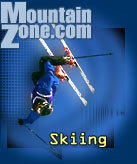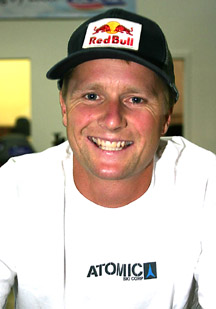
Rahlves' State of Mind
World Cup titles, World Championships medals on his mind
October 4, 2004

|
|
| Photo by Matt Sullivan |
|
A 10-year veteran on the U.S. Ski Team, Daron Rahlves is known as a hard-working, methodical tactician who has achieved the highest level of success of any U.S. downhill or super G racer in history. In the past four years, Rahlves has established himself as Best in the World in his sport and has his eyes set on gold at the 2005 World Championships and 2006 Olympics - both on courses where he has won in the past. Daron took time from his training schedule to talk to the US Ski and Snowboard Association (USSA) about his athletic success.
USSA: You've been known as a downhiller, but this past year you were just 200 points from the overall World Cup title finishing fifth. Had you made that a goal?
Daron Rahlves: The overall (title) was never a real goal of mine, but this past year showed me I have a good chance. My biggest goal is to polish up super G and downhill - try to put down more wins than before and win some titles - and to put more time into giant slalom, giving me better skills overall. Now for the first time I'm thinking about the title. Next year would be good to make the next step - be in the top three. Still, though, downhill is number one.
USSA: It takes years of training and competition for top athletes to find their way to the top. How did you track to becoming one of the Best in the World?
DR: It started with winning back-to-back World Cups in Norway in 2000, which showed me I could be the Best in the World! Then I was third in Kitz (2001), and 10 days later won Worlds (super G in St. Anton). But those were too spread out. My goal was to be consistent. The biggest learning year I had was 2002. I thought I would go into Salt Lake and win the super G for sure and a good chance to take the downhill. But I was too focused on winning one event, rather than trying to work on my tactics and do what I can do on the hill. It was hard to bounce back. But I recommitted myself and was second on the downhill tour (2003). This last season I won more races than ever, including super G. But I'm not one to be satisfied to do what I did last year. I want to keep improving.
USSA: What does it take behind the scenes to prepare mentally and physically for the World Cup season?
DR: I think about skiing every single day. It's nice to be off skis and get refreshed, but mentally I'm thinking about skiing all the time. It's a 365-day job, not just the time I'm on snow. It's managing myself the right way - my business is skiing. Physical conditioning is huge. I'm going to South America a bit later this year so I can be at the top of my physical conditioning and motivational level. It's hard pushing through the whole year but my job is to stay focused and committed all year.
USSA: How does the U.S. Ski Team, including your coaches and teammates, help you achieve your goals?
DR: The coaches manage a great program for us. We have respect for each other. My coaches put it on me to make improvements happen. They'll give me direction, but they'll take input from me so it's not just being told. They provide the training environment for me to be best in the world. Mother nature always has the upper hand, but our coaches make sure we get the most out of every day.
Ultimately, you have to make it happen for yourself, but I learn a lot from what my teammates do. I rely on them for information. If you have other guys on the team who are really successful, that gets you rolling, too. The biggest thing with skiing is mental confidence - belief that you can make it happen. I know I have it in me to win a lot of races. You have a winning feeling on the team and it definitely spreads out. When Bode does well, I do well, and he feeds off me, too.
We also have a core support team back in the office to raise the money, which makes a big difference. The fact that we have Americans from coast-to-coast privately supporting us to be best in the world is extremely gratifying. That support filters directly down to us on race day.
USSA: What's it like at one of your summer on-snow camps?
DR: Training camp is a huge operation, which requires great support from our coaches and our service technicians. At Mammoth Mountain this May, I would come down from a run and find 10 pairs of skis and some boots lined up on the snow. I had to quick change-out my equipment and go back up for another run. If it wasn't for our support crew of coaches and technicians, it would be much more difficult. It's a huge operation trying dozens of pairs of skis, different boots, trying to get the right combination of equipment and learning how to get the most out of it athletically.
USSA: You've always been an action sports enthusiast, with a background in jet skiing and now quite an accomplished career in motocross. How does riding your bike compare to downhill ski racing?
DR: I've grown up riding bikes my whole life with my family. Bottom line, it makes me a better athlete. It helps me to understand what I can pull off as an athlete, on the bike or on my skis. It translates to who you are. I get that rush - that feeling of being challenged and pushed. I like seeing how far I can go. But I'm also careful - I also don't do as much as I probably could on the bike. Mentally, there's a huge advantage to being challenged through the summer.
USSA: You seem to have a knack of winning on the big courses, including both this year's World Championship course in Bormio, Italy, and the Olympic downhill in Sestriere. Is there a common thread?
DR: The biggest thing is going back to those hills and knowing I did it there. I'm excited to go back and ski Sestriere, Bormio, Kitzbuehel and Beaver Creek. When I come into town, I'm ready to go from the first minute on. But I also want to improve my skills at places like Lake Louise where I haven't done well. They're not challenging courses, but they are challenging for me. I want to work on my gliding skills. If I want to win the World Cup downhill title, I have to be able to win on all types of courses, not just the toughest physically.
-- Courtesy of USSA